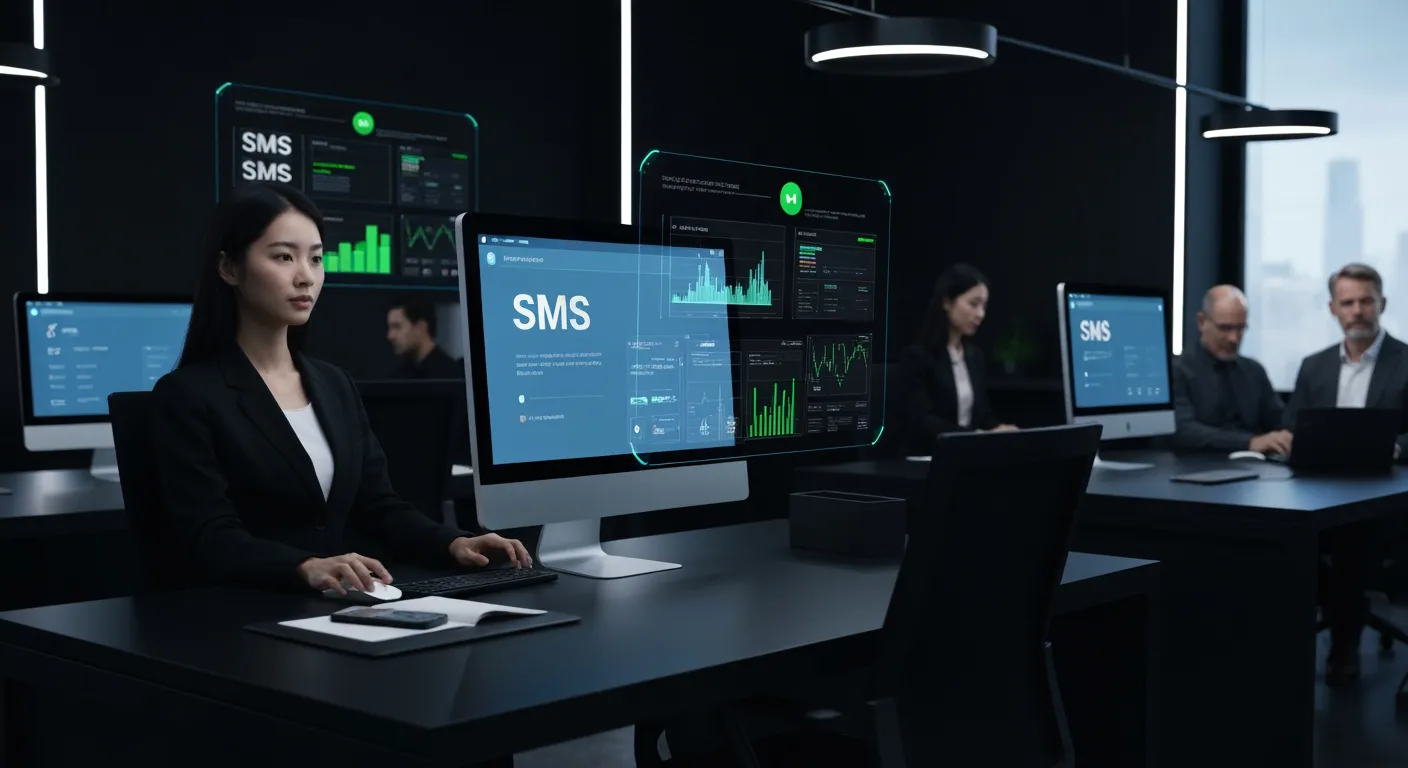Introduction to SMS-Driven Event Coordination
Benefits of SMS in Event Coordination
SMS communication stands out for its exceptional effectiveness in event coordination. With open rates reaching as high as 98% and response rates around 45%, SMS dramatically outperforms email in quickly reaching and engaging attendees. This immediacy ensures critical event information—like reminders, schedule changes, and emergency alerts—is delivered and read promptly.
Overview of SMS Features in Event Management
Modern SMS platforms offer a suite of features tailored to streamline event management. These include:
- Automated Registration & Confirmation: SMS enables easy registration and sends confirmation messages containing QR codes for efficient check-ins.
- Personalized Messaging: Segmenting attendees allows sending targeted updates to specific groups such as VIPs or volunteers.
- Real-Time Updates & Alerts: Organizers can broadcast last-minute changes or emergency notifications instantly.
- Engagement Tools: SMS supports two-way communication like live polls, Q&A sessions, and feedback surveys to boost attendee interaction.
- Analytics & Automation: Platforms provide metrics to optimize outreach and automate message scheduling, reducing manual overhead.
Importance for Nonprofits and Educational Organizations
For nonprofits and educational institutions, SMS is a cost-effective tool that enhances community engagement and event participation. Features like automated reminders and follow-up surveys simplify managing volunteers and donors. Integration with CRM systems ensures personalized communication, crucial for maintaining trust and long-term relationships. Additionally, SMS helps fulfill compliance requirements through opt-in management, protecting organizations legally while maximizing outreach.
Using SMS-driven event coordination empowers organizations to connect efficiently with their communities, driving higher attendance and a smoother event experience.
High Impact of SMS Communication in Event Management
Why is SMS considered effective for event communication compared to other modes?
SMS boasts open rates as high as 98%, with messages typically read within minutes, and response rates around 45%, far exceeding the average email open rate of about 20% and email response rates near 6%. This high level of engagement makes SMS an extremely effective channel for event communication via SMS.
SMS open and response rates
SMS messages achieve an astonishing 98% open rate, ensuring that almost all recipients see the message promptly. Additionally, the 45% response rate facilitates quick interactive engagements such as RSVPs, polls, or feedback collection. These metrics demonstrate SMS’s superior reach and communication effectiveness for event managers leveraging SMS.
Advantages over email communication
Compared to email, SMS stands out due to its immediacy and higher visibility. Emails often suffer from inbox clutter or delayed reading times, while SMS messages are delivered directly to mobile devices and are usually read within three minutes. This reduces the chances of missing important updates like schedule changes or last-minute notifications. This advantage is discussed in detail in resources on email and SMS marketing.
Immediacy and accessibility of SMS
Most event attendees constantly carry their mobile phones, making SMS an immediate and accessible communication method. This constant accessibility enables organizers to send reminders, alerts, or confirmations that are received and acted upon without delay, significantly reducing no-shows and logistical mishaps. Learn more about SMS reminders and event alerts.
Critical role in real-time updates
SMS empowers organizers to communicate urgent information during events, including schedule shifts, venue changes, or emergency notifications. This real-time communication channel enhances attendee experience and safety while maintaining smooth event operations. The importance of real-time event updates via SMS is emphasized in many expert guides.
In summary, SMS’s impressive open and response rates combined with its immediacy and mobile accessibility establish it as a critical tool for effective event communication, outperforming traditional email and enhancing real-time attendee engagement. For comprehensive best practices, see SMS for event marketers.
Streamlining Attendee Management with SMS Automation
How does SMS simplify attendee registration and confirmations?
SMS-based systems automate registrations through text keywords and guided prompts, allowing attendees to quickly sign up using their mobile devices without navigating complex web forms.
Once registered, attendees receive confirmation messages via SMS that often include unique QR codes. These codes streamline event check-in, enabling quick, contactless entry and reducing wait times.
Automated reminder messages are sent as the event approaches, significantly lowering no-show rates by keeping the event top-of-mind for participants with automated SMS reminders for events.
Mobile tickets and QR codes delivered via SMS replace printed tickets, enhancing convenience and accessibility for attendees while supporting environmental sustainability.
Together, these Intelligent automation for event management simplify the attendee registration process, deliver timely confirmations, and ensure efficient communication, elevating the overall event experience and reducing administrative burdens for organizers.
Optimizing Event Logistics and Coordination Through SMS
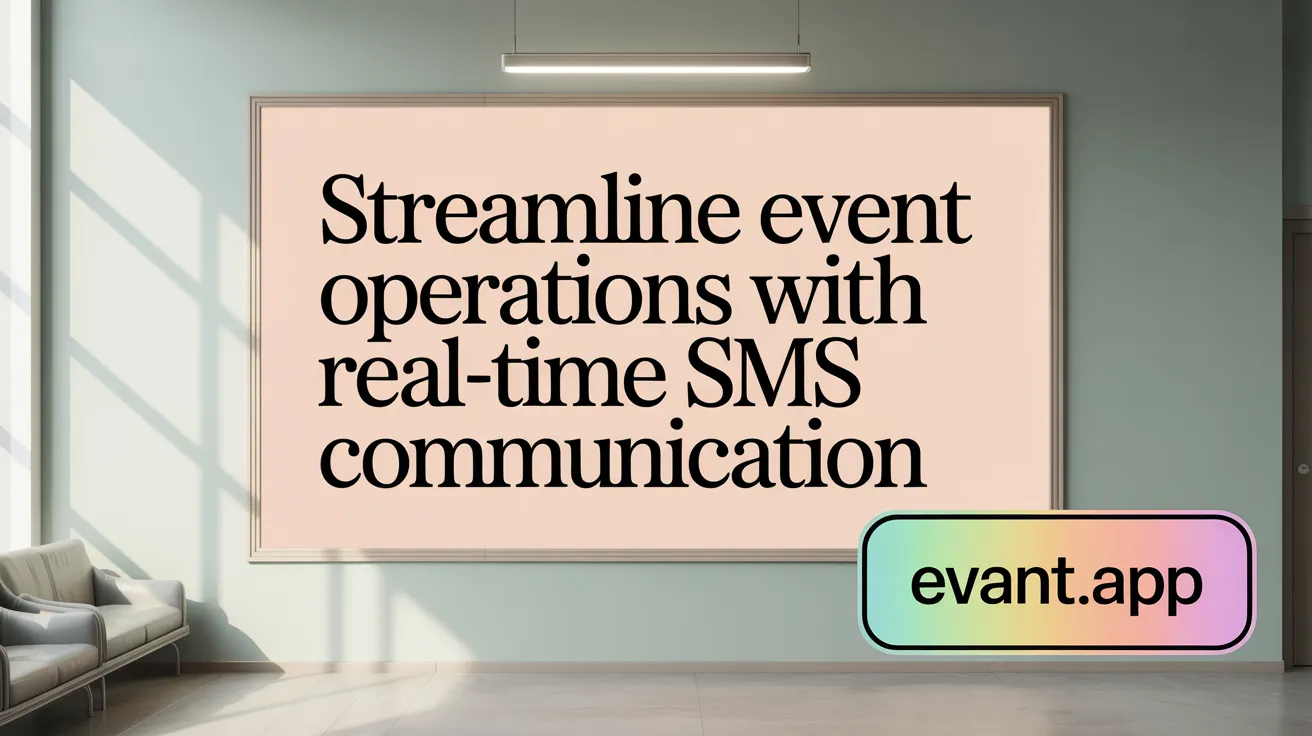
What role does SMS play during the active event phase?
During events, SMS serves as a vital tool for immediate and effective communication. It allows event organizers to send real-time SMS updates in event management about schedule changes, venue directions, or last-minute announcements directly to attendees' mobile devices. This instant access to information minimizes confusion and improves the overall event flow.
How does SMS assist in staff coordination?
Coordinating event staff is streamlined through SMS by enabling rapid sharing of roster confirmations, shift changes, or urgent task assignments. This ensures team members are well-informed and able to respond flexibly to evolving event demands, enhancing operational efficiency. Learn more about Managing Event Staff via SMS.
How is SMS used for emergency notifications?
Emergency alerts delivered via SMS offer fast, direct outreach to everyone present, ensuring prompt dissemination of critical information such as safety instructions or evacuation orders. Such swift communication helps manage crises by reducing delays and confusion during emergencies. See details on Emergency Event Notifications via SMS.
What interactive engagement options does SMS provide during events?
Event organizers can boost attendee involvement with SMS-powered interactive features like live polling, Q&A sessions, and contests. These engagements not only increase participation but also make the event experience more dynamic and memorable, fostering a stronger sense of community. Explore SMS polls and Q&A features.
By utilizing SMS to handle Real-time analytics dashboard and live event updates, coordinate staff, deliver urgent alerts, and encourage interaction, event managers can significantly enhance operational effectiveness and attendee satisfaction.
Personalization and Segmentation for Enhanced Attendee Engagement

How does targeted SMS improve event communication?
Segmenting attendees and sending personalized SMS messages tailored to specific groups such as VIPs, general attendees, or volunteers significantly improves communication effectiveness. By customizing content using merge tags, organizers can address recipients by name and reference relevant event details, which establishes a stronger personal connection and increases message relevance (SMS Personalization with Merge Tags, Personalized SMS messaging).
Advantages of Audience Segmentation
- Higher engagement rates: Targeted campaigns deliver messages that resonate with recipients' specific interests or roles (Segmentation in SMS campaigns, Audience segmentation for SMS).
- Improved response rates: Personalized texts encourage prompt replies and actions, such as RSVPs or feedback (How to RSVP via Text, SMS Surveys for Nonprofit Feedback).
- Efficient resource allocation: Focusing communications minimizes unnecessary messaging and optimizes outreach budget (Resource allocation and logistics, SMS automation for event campaigns).
Special Communications for VIPs and Groups
Event platforms enable sending exclusive updates, access instructions, or perks to VIP attendees, fostering a premium experience (VIP SMS notifications, VIP Event Communications). Similarly, segmented messaging allows volunteers or sponsors to receive role-specific information, enabling smoother event coordination (Vendor coordination automation, SMS for Staff Coordination).
By leveraging segmentation and personalization tools, event organizers can create meaningful, timely interactions that increase satisfaction and participation among diverse attendee groups (Effective SMS Communication for Events, Increasing Event Attendance with SMS).
Integrating SMS with Event Management Platforms and CRM Systems

How do SMS platforms integrate with existing event tools and CRM systems?
Many SMS platforms are designed to seamlessly integrate with popular event registration, ticketing systems, and CRM solutions such as Salesforce and DonorPerfect. This Integration of SMS platforms with CRM systems enables automated workflows that connect SMS communications directly to attendee data, simplifying event coordination.
Platform integrations
SMS platforms connect with event tools to synchronize registrant and ticket purchaser information. This allows automated delivery of registration confirmations, reminders, and real-time event updates through SMS (Automated registration forms, Event Registration Software, Event Registration Confirmations via SMS). Integration with CRM software further supports segmentation, targeting, and personalized messaging to enhance engagement (SMS integration benefits.
Automation workflows
By linking SMS systems with CRM and event management platforms, organizers can automate the sending of RSVP reminders, payment confirmations, and follow-up messages (Automated SMS reminders for events, Send calendar invites via text message, Automated Event Text Messages. These workflows reduce manual tasks, ensure timely communications, and improve overall efficiency (Automated contracts and scheduling).
Data synchronization
Continuous data synchronization updates attendee lists and contact information across systems, ensuring all communications reflect current event status (Upload attendee lists for SMS). It also helps maintain compliance by managing opt-in and opt-out preferences effectively (SMS opt-in procedures, Managing SMS opt-in and opt-out.
Analytics and performance tracking
Integrated dashboards consolidate SMS campaign metrics with event and CRM data. Organizers can monitor delivery rates, open and response rates, and engagement patterns, enabling real-time adjustments and data-driven decisions to optimize communication strategies (Real-time analytics dashboard, SMS campaign analytics, SMS analytics guide.
This cohesive integration between SMS platforms, CRMs, and event management tools empowers event planners to Streamline Event Planning, boost attendance, and achieve higher participant satisfaction efficiently (SMS for Event Marketing, Event Management with SMS.
Leveraging Analytics to Measure and Enhance SMS Campaign Effectiveness
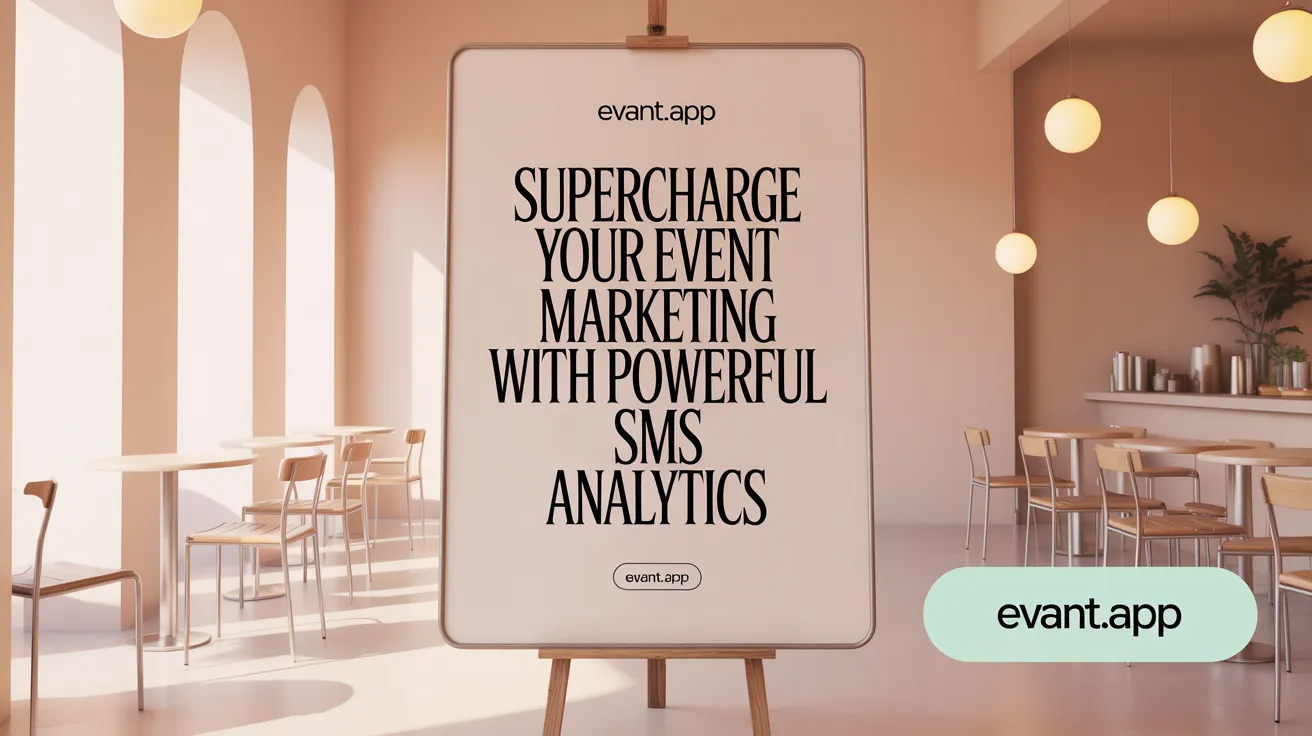
What analytics capabilities do SMS event platforms provide?
SMS event platforms deliver comprehensive analytics, tracking essential metrics such as delivered and opened message rates, response statistics, and opt-in/opt-out trends. This data allows event organizers to monitor how well their campaigns perform in real-time and understand audience engagement levels. For more details, see the SMS analytics guide.
How do delivered and response rates impact campaign success?
Tracking delivery confirms messages reach recipients, while response rates reveal how attendees interact with communications. High open and reply rates indicate effective messaging that can boost attendance and engagement. Learn about SMS event marketing benefits with high open and response rates.
Why are opt-in and opt-out trends important?
Monitoring opt-in and opt-out patterns ensures compliance with legal regulations and helps maintain a clean, engaged contact list. It also guides organizers in refining message targeting to better suit audience preferences. Explore SMS opt-in procedures and managing SMS unsubscribe options.
How do real-time performance adjustments optimize communication?
SMS platforms provide near-instant feedback, enabling adjustments during campaign rollout. Organizers can modify message timing, content, or segmentation based on live data, improving outreach effectiveness. See how real-time SMS updates in event management and SMS campaign analytics can boost event marketing.
What role does A/B testing and segmentation analytics play?
By testing different message versions and segmenting contact lists by demographics or engagement, organizers can identify the most impactful content and strategies, resulting in more personalized and successful campaigns. Learn more on A/B testing and segmentation analytics in SMS campaigns.
Leveraging these analytics features empowers event managers to optimize SMS communications for higher participation, smoother logistics, and improved overall event outcomes.
Cost Efficiency and Operational Benefits of SMS Event Management
What operational advantages does SMS provide to event organizers?
SMS automation transforms event planning by significantly slashing the time needed for coordination, with studies showing a reduction of up to 70% reduction in planning time. This efficiency gain also reflects in cost savings, where expenses can be cut by approximately 50% cost savings from automation, benefiting organizers with limited resources.
Automation capabilities streamline tasks such as automated registration forms, payment processing system, and automated SMS reminders for events. These features minimize manual workloads, reduce errors, and help maintain high levels of attendee satisfaction through instant updates and reminders.
The high open rate of SMS messages (up to 98%) ensures timely delivery of critical information, reducing no-shows and enhancing event turnout. This reliability improves return on investment by optimizing attendance without increasing marketing expenses. See The Power of SMS for Event Marketing and Management for detailed insights.
Resource optimization is another key advantage. SMS platforms facilitate staff coordination by sending roster confirmations and real-time updates, enabling event teams to respond rapidly to shifting needs without escalating labor costs. Learn about Event Management with SMS for more on team synchronization tools.
Overall, the operational benefits of SMS in event management combine automation and cost efficiency to create a seamless event experience for both organizers and attendees. For a comprehensive overview, visit Intelligent automation for event management.
Ensuring Compliance and Best Practices in SMS Event Communication
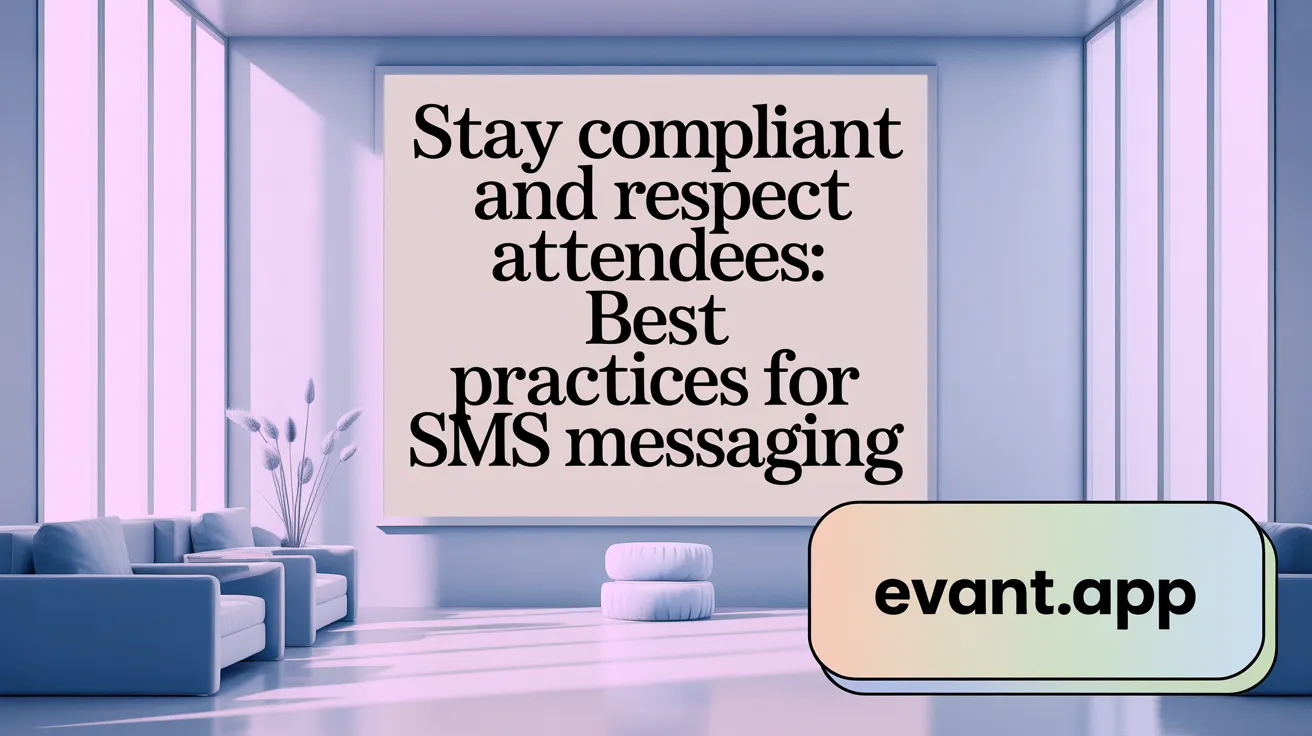
What compliance and best practices should be followed when using SMS for events?
Compliance with regulations such as the Telephone Consumer Protection Act (TCPA) and 10DLC is essential when utilizing SMS for event communication. Event organizers must ensure they obtain explicit opt-in consent from recipients before sending any messages. This safeguards legal compliance and respects recipients' preferences.
Providing straightforward opt-out options is equally important, allowing recipients to unsubscribe easily at any point. This transparency fosters trust and keeps communication ethical.
Message personalization enhances engagement by addressing attendees by name or tailoring content based on segments. However, personalization should avoid being intrusive or overly frequent to respect privacy and prevent message fatigue.
Timing and frequency must align with the event lifecycle — from pre-event promotion through day-of reminders to post-event follow-ups. Scheduling messages thoughtfully prevents overwhelming recipients and maximizes message effectiveness.
In summary, following legal regulations, securing consent, enabling opt-outs, personalizing content responsibly, and timing communications strategically form the foundation of effective and compliant SMS event communication.
Conclusion: Harnessing SMS to Revolutionize Event Coordination
The Benefits of SMS in Event Management
SMS transforms event coordination by delivering instant, direct communication with unmatched open rates of up to 98%. It simplifies logistical updates, boosts attendance, and enhances attendee engagement through real-time messaging, personalized reminders, and interactive features like live polls and Q&A sessions. Automation capabilities reduce administrative workload, improve operational efficiency, and enable targeted outreach to segmented audiences, making SMS an indispensable tool for event organizers.
Looking Ahead
As event technology advances, SMS platforms will increasingly integrate with AI and CRM systems, enabling smarter audience segmentation, personalized messaging, and predictive analytics. This evolution will empower nonprofits and educational organizations to optimize resource allocation, enhance participant experiences, and respond dynamically to event-day changes, fostering stronger community connections and higher event success rates.
Take Action
Nonprofits and educational institutions should embrace SMS as a core event communication strategy. By selecting reliable SMS platforms with automation, segmentation, and real-time analytics, they can better engage communities, reduce no-shows, and streamline event logistics. Initiating SMS campaigns today offers a powerful avenue to cultivate sustained participation and elevate the impact of their missions.
Related Blogs


How Community Churches Should Leverage SMS to Boost Engagement
Michael PedoeemStruggling with low church attendance? Discover how to leverage SMS to reach 98% of your congregation instantly and review the top 5 church communication platforms.
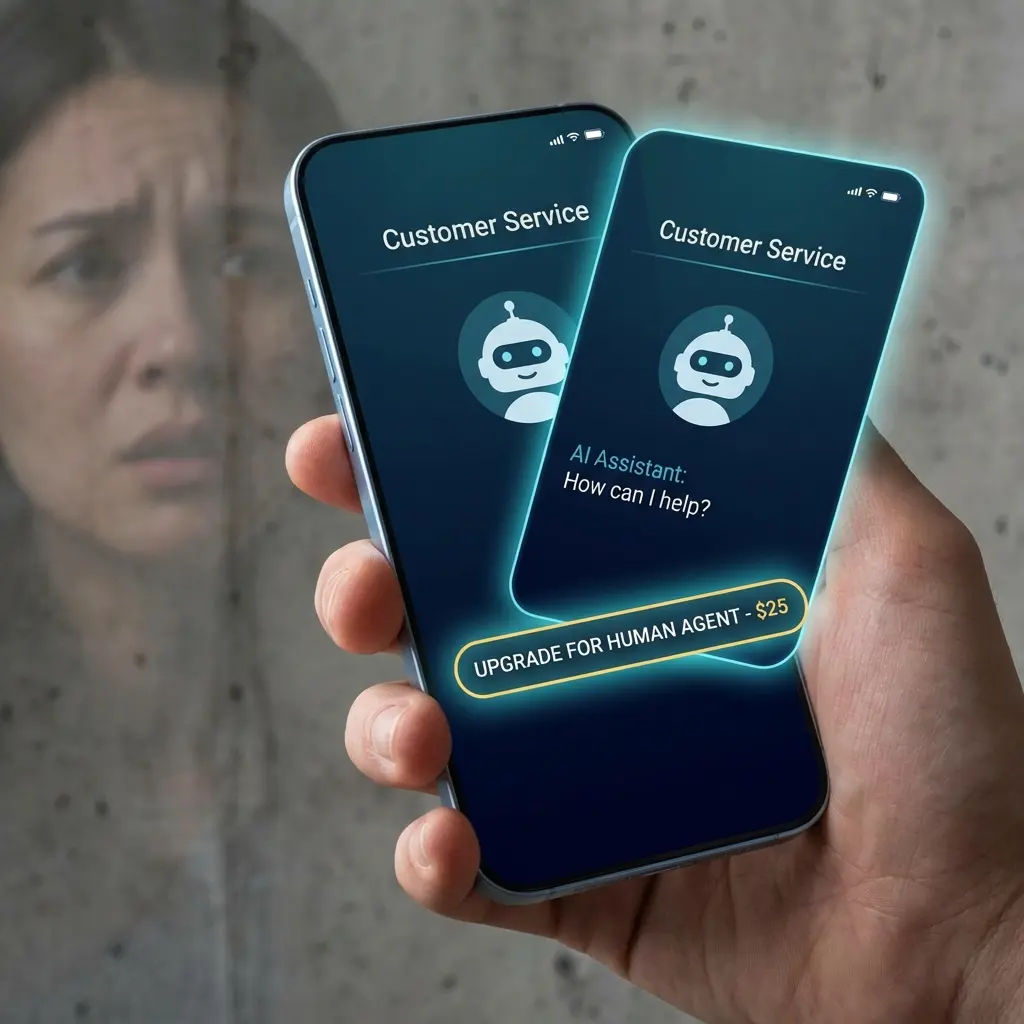

SMS for Churches: A Guide to Better Engagement
Michael PedoeemLearn how SMS for churches can boost engagement, improve communication, and streamline event management. Discover best practices for church texting today.
Ready to transform your community



